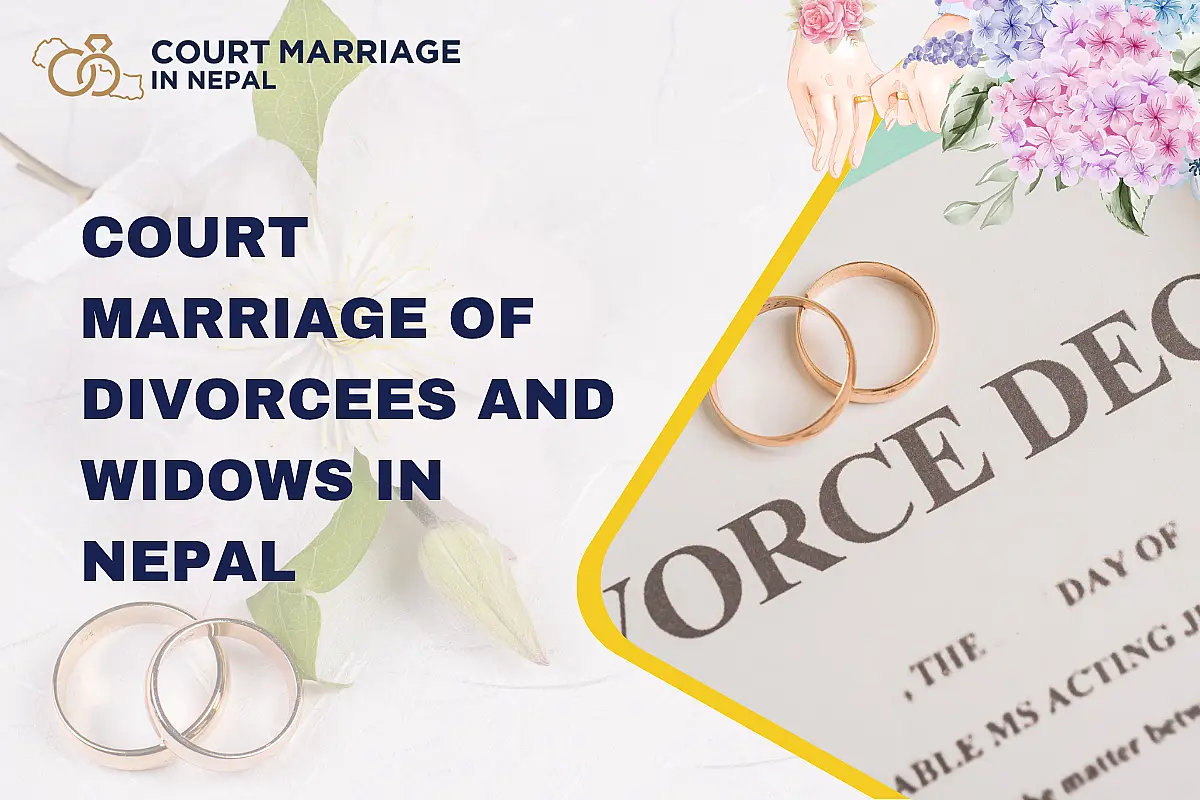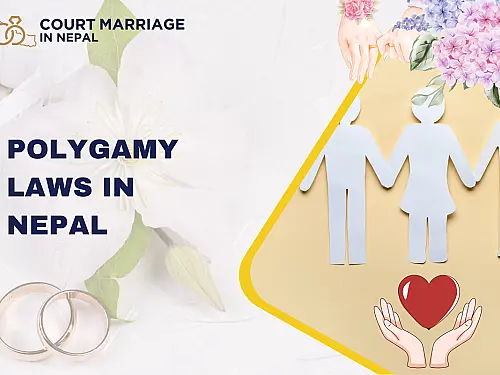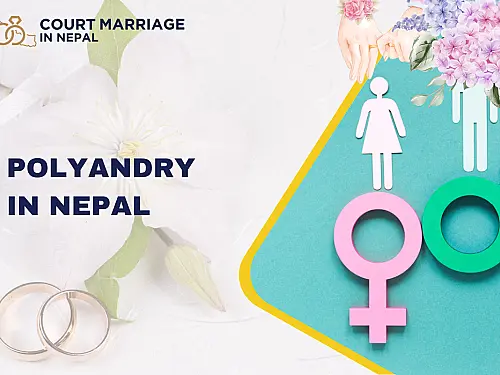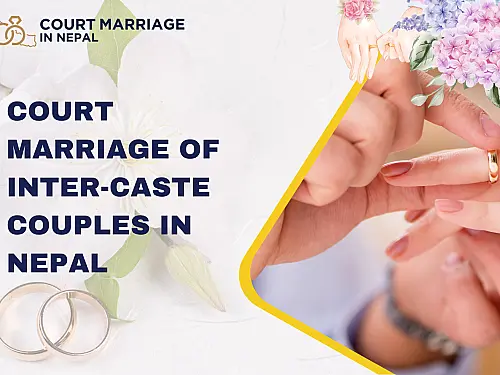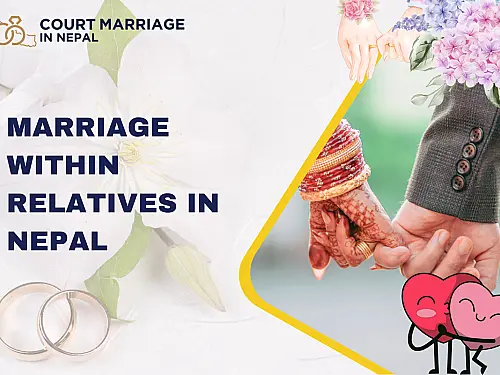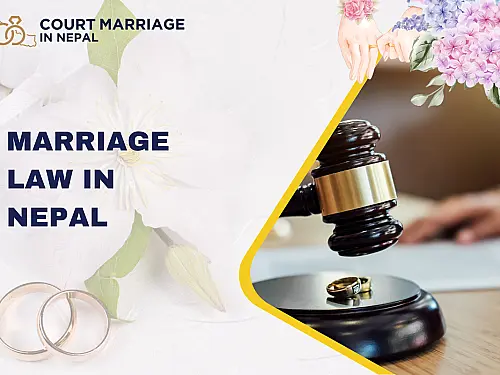Court marriage (Nepali: अदालतमा विवाह pronounced [ʌdaːltma bibaː]) is a type of marriage that is done by registering the marriage at a district court in Nepal. Court marriage is a legal process that requires both the man and the woman to accept each other as husband and wife and to fulfill certain conditions set by the law. However, some people may face difficulties or discrimination in conducting a court marriage due to their previous marital status, such as being a divorcee or a widow. This article will help you know the legal formalities and social stigma of court marriage of divorcees and widows in Nepal.
Legal formalities
According to Section 70 of the Civil Code 2017, one of the conditions for a person to get married in Nepal is that both the man and the woman must be unmarried or single or divorced. This means that anyone who has been divorced or widowed can legally get married again in Nepal, provided they have fulfilled other conditions such as age, consent, and blood relation.
If a divorcee or a widow wants to conduct a court marriage, they need to submit an application to the concerned district court with the following documents:
- Duly filled and signed application form in the prescribed format;
- Original and notarised copy of citizenship certificate of applicants;
- Original and notarised copy of citizenship certificate of witness;
- Both applicants shall furnish recommendation letters issued from their local wards proving their unmarried or single or divorced status;
- Recommendation letters from local ward offices for temporary residence–This is required for both the applicants;
- 4 copies of passport size photo each; and
- Bank voucher equivalent to Rs 500 as a court fee
Additionally, if a divorcee wants to conduct a court marriage, they need to submit the following documents:
- Original and notarised copy of divorce certificate or decree;
- Original and notarised copy of property partition agreement or order (if any); and
- Original and notarised copy of child custody agreement or order (if any)
Similarly, if a widow wants to conduct a court marriage, they need to submit the following documents:
- Original and notarised copy of death certificate of deceased spouse;
- Original and notarised copy of property partition agreement or order (if any); and
- Original and notarised copy of child custody agreement or order (if any)
After verifying all the documents, the court will register the application and schedule a date for an appointment. On the scheduled date, both the applicants shall be present in court along with their witnesses. If all the documentation is done properly and all the conditions set in the law are fulfilled, the judge will approve the marriage registration application and the court administration will issue a certificate of the same.
Social stigma
Despite the legal formalities, court marriage of divorcees and widows still faces social stigma and challenges in Nepal. Many families and communities do not accept or support remarriage of divorcees and widows because they consider them against their culture, religion, or tradition. According to research done by Women for Human Rights (WHR), an NGO working for single women's rights in Nepal, remarried women often face harassment, ostracism, discrimination, and violence from their families and society. Additionally, many remarried women face difficulties in accessing education, health care, employment, housing, and other services due to their previous marital status.
There have been several incidents of violence and killings against remarried women in Nepal. For example, in 2018, a woman who remarried after her husband's death was killed by her brother-in-law in Kavre district. In 2020, a woman who remarried after her divorce was killed by her ex-husband in Rupandehi district.
However, there are also some positive signs of change and acceptance in Nepali society. Some remarried women have received support and recognition from their families and communities. Some NGOs and media outlets have also been raising awareness and advocating for remarriage rights. Some celebrities and politicians have also set examples by remarrying after their divorce or widowhood.
Conclusion
Court marriage is a legal process that requires both the man and the woman to accept each other as husband and wife and to fulfill certain conditions set by law. However, some people may face difficulties or discrimination in conducting a court marriage due to their previous marital status, such as being a divorcee or a widow. Court marriage of divorcees and widows is legal and possible in Nepal, provided they have fulfilled the legal formalities and submitted the required documents. However, court marriage of divorcees and widows still faces social stigma and challenges in Nepal. Many families and communities do not accept or support remarriage of divorcees and widows because they consider them against their culture, religion, or tradition. However, there are also some signs of change and acceptance in Nepali society. Some remarried women have received support and recognition from their families and communities. Some NGOs and media outlets have also been raising awareness and advocating for remarriage rights. Some celebrities and politicians have also set examples by remarrying after their divorce or widowhood.
At Court Marriage In Nepal, a registered law firm operating as Court Marriage In Nepal Pvt. Ltd., we specialize exclusively in Court Marriage Nepal. As the first law firm in Nepal dedicated to court marriage services, we assist both Nepali citizens and foreign nationals with the court marriage registration process in Nepal, including complete legal support for court marriage registration for foreign citizens in Nepal. As a trusted marriage firm in Nepal and a licensed law firm in Nepal, we ensure a smooth, lawful, and stress-free experience. Contact us today for confidential assistance with court marriage registration in Nepal.

